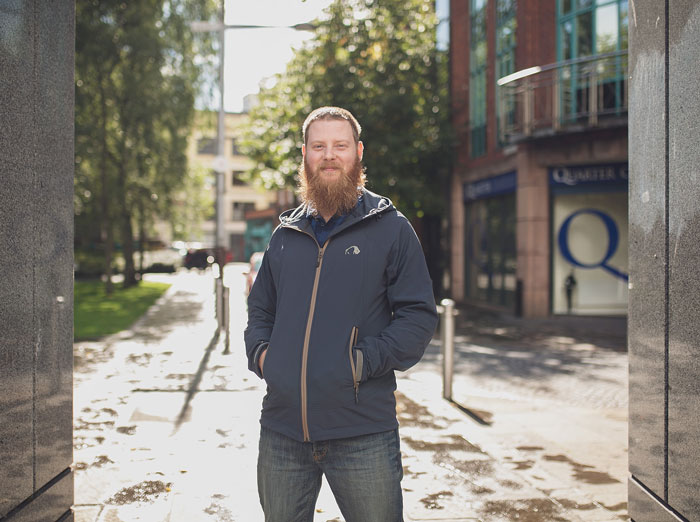Neil Kenneway
Neil Kenneway is from Newtownabbey. In 2014, his mum was diagnosed with head and neck cancer and Neil became her full-time carer: “I left my job to start into a couple of years of 24/7, full-time, on-call caring.”
Intense radiotherapy left her unable to eat or drink, made even more challenging after surgery. A gastrostomy or g-tube, inserted through the stomach wall and fitted to a feeding pump, provides nutrition and medication. But Neil’s experience has prompted him to challenge systemic failure. Not least among them is the repeated failure of the pumps and the lack of support for patients and families in similar circumstances: “When mum first came out of hospital, I was watching YouTube videos to learn how to do it because that’s the gap that exists.”
What is the challenge you’re working to address in Belfast?
Based on my experience, there are two big challenges: raising awareness of issues relating to particular cancers and building knowledge amongst hospital staff. Overall, it’s about a system that doesn’t respond properly. To start with, Belfast doesn’t have a support network for people who have g-tubes or their families. I had very little and very inadequate training from the hospital, and nothing about what to do in an emergency. Everything I learnt was through YouTube videos and hands on experience. But, the big issue in that is the incredibly high rate of failure of the feeding pumps. So when you’re sent off to provide care for people you love without knowing exactly what you need to do, and when things go wrong, it’s scary, it’s stressful, and it’s very frustrating. The failure rate of the pumps is shocking: they’re supposed to last three years but, at most, they last six months! That’s a lot of stress for people with cancer and their families. When the pumps fail you’re left to call a customer service number for a major medical company; my experience of them is really bad and they need to be improved dramatically. When things go wrong so often, the people with the power to make decisions need to look at what’s happening, but that isn’t happening here at all. It’s not just with medical staff but with local cancer charities and the Department of Health who are reluctant to get involved with the issue.
How are you thinking and doing differently?
I started to think, ‘could I build a better type of pump? Could I get a team of people together to look at a better design?’ After a lot of meetings with companies and places that support idea development like Big Small Idea and the Prince’s Trust, I quickly realised it wouldn’t be simple. Medical considerations make it pretty complex, but I’m looking for a team of people, engineers, software coders, hardware designers, to explore a new feeding pump design. It’s not easy to reverse-engineer the pumps as they’re only on loan from the hospital. But it’s important that a new design is explored. It might be about testing small ideas and seeing how we can build on and improve those.
As well as the design, I’m looking at bringing an existing charity to Northern Ireland or setting one up. There’s a UK charity, called PINNT, but they have no presence in here. It’s really important to raise awareness of the challenges and to build knowledge amongst medical and nursing staff, and of course, to provide support for patients and carers. Lots of the local cancer charities are much more generalised in their approach so I feel like it’s important to have a proper support system for people with g-tubes and all of the issues they bring. I’m not sure if the reluctance of the local cancer charities to get involved is because they know how difficult it is to engage with decision makers and know the battles. But, just because something is difficult to change doesn’t mean we all shouldn’t try! Basically, I want to tap into my experiences and see if there are people out there who share my passion for changing the system, either through a new pump design or starting a support network.
What will make a Successful Belfast for you?
It will be a city where the system is more willing to respond, not just listen but to take action when people point out the challenges. From my experience, it’ll be specifically when there’s specialised care and support for people with gastronomy tubes, somewhere where people understand the specific circumstances and have the expertise of supporting patients and families.


